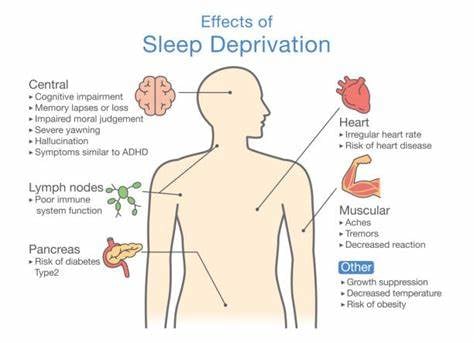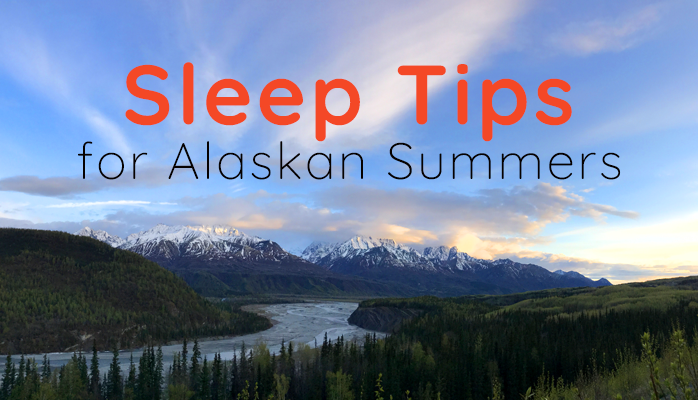The extreme lighting conditions in Alaskan summers can make it very challenging to keep a regular sleep schedule for a number of reasons, including:
- Sunlight or light all night long
- Doing shift work during summer (fishing, construction, etc.)
- Pressure to be packing in full schedule in short summer season
- Transitioning from Alaskan winters
- Pressure to be soaking up as much sunlight as possible
How much you struggle with the light depends on:
- How far north you are
- How sensitive you are to light
- What existing measures you take to ensure good sleeping habits
The primary concern here is the development or worsening of insomnia and circadian rhythm disorders, because our circadian rhythm (sleep/wake cycle, biological clock) is managed by melatonin, which in turn responds to light, dark, and changes in light and darkness.
During transition from light to dark, we produce melatonin (makes us go to sleep), and during transitions from dark to light we repress melatonin (makes us wake up). Without these transitions in Alaska, it can be much harder for our body to have the clues needed to produce melatonin at night and get to sleep.
What is Insomnia?
Insomnia is a sleeping disorder that prevents you from getting enough sleep because:
- You have trouble falling asleep
- You have trouble staying asleep throughout the night
- You wake up much earlier than you want
If you have insomnia, you never feel like you are getting enough rest , because you aren’t, at least 3 nights per week for a given time. It’s frustrating to not be able to sleep when you want to, and there are a whole host of risks associated with sleep deprivation.

There are two types of insomnia, secondary insomnia and primary insomnia:
- Secondary insomnia: insomnia as a direct result of another cause
- Primary insomnia: insomnia without an underlying cause
Insomnia also varies in how long it lasts and the frequency with which it occurs:
- Acute insomnia - short-term, lasting up to a month
- Chronic insomnia - long-term, lasting longer than a month
What are Circadian Rhythm Disorders?
Your circadian rhythm is your biological sleep clock. This biological sleep clock is a part of your brain called the suprachiasmatic nucleus of the hypothalamus, and sits right behind the nerves of your eyes.
Circadian rhythm disorders include insomnia, but also encompass any type of sleeping problem you may have, such as:
- Erratic sleep patterns
- Shifting biological clock
- Natural sleep/wake times that are abnormal
A good example of this is jet lag, which is a temporary circadian rhythm disorder that makes it difficult to sleep at “regular” times, but once asleep you don’t have trouble getting enough sleep.
Lifestyle Tips for Sleeping in Alaskan Summers
Some lifestyle choices that will help you get enough sleep during the spring to summer transition and throughout the summer are:
- Using light therapy during winter
- Maintaining pre-sleep ritual every night, such as reading, meditating, etc.
- Having consistent exercise
- No blue light in the hour before bed
- No alcohol in the hour before bed
- No food in the hour before bed
- Having a bedtime that you commit to as often as possible
- Taking hot baths before bed, as when you get out of the bath, it simulate a core temperature drop (i.e. night time is coming!) that is a cue for sleep
Setting a pre-bedtime routine is important. If you have one for your children, then setting one up for you is essentially the same.
Environmental Tips for Sleeping in Alaskan Summers
The environment in which you sleep will make a significant difference for your success at sleeping well during Alaska’s midnight sun/twilight months. The most important factors are:
- Have blackout curtains in your room
- Try and use your bedroom for only sleeping as much as possible (don’t work out, do work, etc.)
- Keep your room cooler at night
- Use essential oils, candles, and/or plants to make your room smell comforting/fresh
- Invest in a comfortable pillow for your head and legs
- Invest in a comfortable mattress (they are often on sale and they last a long time, after all)
- Use white noise machines (i.e. a fan) or ear plugs if needed
The reality is that seasonal insomnia or sleep disorders may be very difficult for you to prevent or mitigate. If you have tried everything and are still struggling, please click the orange button below to take a free online sleep test and talk with one of our sleep health professionals.


